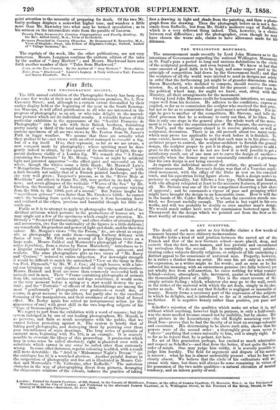ART SCHEFFER.
The death of such an artist as Ary Scheffer claims a few words of comment beyond the mere obituary memorandum.
Scheffer holds a kind of mid position between the sacred art of the French and that of the new German school—more placid, deep, and esoteric than the first, more human, and less pietistic and encumbered by revivalism than the second. He is essentially a sacred painter; treating either subjects directly religious, or subjects of life embodying a distinct appeal to the conscience of universal man. Properly, however, he is rather a thinker than an artist. He uses his art only as a vehicle for expression, as a writer might do his words ; and as soon as he has enforced his meaning, with an earnestness genuine (we fully believe) yet not wholly free from self-assertion, he cares nothing for what remains behind—colour, atmosphere, life, movement, quaint or beautiful detail, the thousandfold phases of reality. This is the exact reverse of the simply artistic feeling ; which, whatever else may go to the wall, revels in the riches of the material with which the art deals, simply in its cha- racter as such. We do not say that Scheffer is negligent or insensible of beauty. Beauty forms a necessary part of the expression of the subjects in which he delights, and is introduced so far as it subserves that, and no farther. It is negative beauty rather than positive, yet pure and true.
Scheffer's rejection of the qualities which make art what it is, and without which anything, however high in purpose, is only a half-result, was the more marked because caused not by inability, but by choice. His early picture in the Luxembourg—the old Knight mourning over his Dead Son—proves that he had the faculty of at least an average colourist and executant. His determining to be above such aids, shows that his powers were of the second order : a thoroughly great man never is " above" anything that comes naturally to him, and is simply right. In so far as he rejects that he is pedant, not hero.
No art of this generation perhaps, has excited so much admiration and respect as Scheffer's—and that from the better, if not quite the best, order of minds. One may judge him coldly, it is scarcely possible to judge him harshly. The field for argument and dispute of his merits is narrow ; what he has is almost undeniably present : what he has not, clearly absent. We believe that the circle of his enthusiasts will de- crease with time, but there will always be some remaining in virtue of his possession of the two noble qualities—a natural elevation of mental tendency, and an inborn purity of soul.


































 Previous page
Previous page